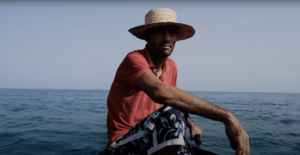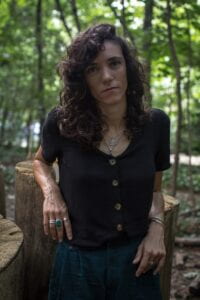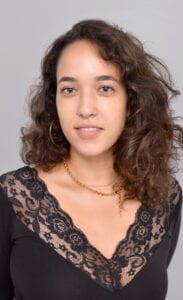| About | Artists | Events | Installation Views |
 Songs Of Bahara
Songs Of Bahara
video, 04:53 minutes, 2021
Songs of Bahara delves into the soundscape of the bahara (fishermen) from the northwest of Tunisia. This sea is mundane, the site of their daily labor; it is hostile, the place where they take hazardous risks; it is home, a body of water whose currents, eddies, and flows are site specific. The artwork juxtaposes visuals of being at sea with a sound composition that mixes the tale of one fisherman in rough waters with the everyday rhythms of life on the boat. Songs of Bahara asks what can we hear, what other sounds resonate, when the sound of the human voice dissipates?
FRENCH: Songs of Bahara plonge dans le paysage sonore des baharas (pêcheurs) du nord-ouest de la Tunisie. Une mer banale, lieu de leur travail quotidien. Une mer hostile, l’endroit où ils prennent des risques. Une mer qui est leur foyer, un plan d’eau dont les courants, les tourbillons et les écoulements y sont spécifiques. Cette œuvre juxtapose des images en mer avec une composition sonore qui mélange le récit d’un pêcheur dans des eaux agitées avec les rythmes quotidiens de la vie sur le bateau. Songs of Bahara demande ce que nous pouvons entendre, quels autres sons résonnent, quand le son de la voix humaine se dissipe ?
BIO:
 MARGAUX FITOUSSI is a visual anthropologist. Her film work has screened at Film Society of Lincoln Center in New York, Director’s Note, Musée d’art et d’histoire du Judaïsme in Paris, Cultural Pinacothèque in Rio de Janeiro and São Paulo, and SAVVY Contemporary in Berlin. Her translations have been published by AUC Press, Archive Books, and Liverpool University Press. Before beginning her doctorate in anthropology at Columbia University, she studied religion at Harvard University and history at UC Berkeley.
MARGAUX FITOUSSI is a visual anthropologist. Her film work has screened at Film Society of Lincoln Center in New York, Director’s Note, Musée d’art et d’histoire du Judaïsme in Paris, Cultural Pinacothèque in Rio de Janeiro and São Paulo, and SAVVY Contemporary in Berlin. Her translations have been published by AUC Press, Archive Books, and Liverpool University Press. Before beginning her doctorate in anthropology at Columbia University, she studied religion at Harvard University and history at UC Berkeley.
FRENCH: MARGAUX FITOUSSI est une anthropologue visuelle. Ses films ont été projetés au Film Society of Lincoln Center à New York, Director’s Note, Musée d’art et d’histoire du Judaïsme à Paris, Cultural Pinacothèque à Rio de Janeiro et São Paulo, et SAVVY Contemporary à Berlin. Ses traductions ont été publiées par AUC Press, Archive Books et Liverpool University Press. Avant de commencer son doctorat en anthropologie à l’Université Columbia, elle a étudié la religion à l’Université Harvard et l’histoire à l’Université de Berkeley.
 MYRIAM AMRI is a visual artist and anthropologist. Through moving-image, writing, and sound she centers materiality and circulation as methods to follow capitalist imaginaries. Her works have been part of the Jaou Photography Biennale, the Protocinema exhibition in New York and Savvy Contemporary in Berlin. Her recent writings have appeared on SekkaMag, Kohl Journal, and Rusted Radishes. She is currently completing a PhD in anthropology at Harvard University and is the co-founder of “Asameena”, a literary collective.
MYRIAM AMRI is a visual artist and anthropologist. Through moving-image, writing, and sound she centers materiality and circulation as methods to follow capitalist imaginaries. Her works have been part of the Jaou Photography Biennale, the Protocinema exhibition in New York and Savvy Contemporary in Berlin. Her recent writings have appeared on SekkaMag, Kohl Journal, and Rusted Radishes. She is currently completing a PhD in anthropology at Harvard University and is the co-founder of “Asameena”, a literary collective.
FRENCH: MYRIAM AMRI est une artiste visuelle et anthropologue. Sa pratique explore les imaginaires capitalistes à travers l’image en mouvement, l’écriture et le son. Ses créations ont fait partie de la Biennale Photographique de Jaou, l’exposition Protocinema à New York et Savvy Contemporary à Berlin. Ses récents écrits ont parus dans SekkaMag, Kohl Journal et Rusted Radishes. Actuellement en doctorat d’anthropologie à l’université de Harvard, elle est aussi la cofondatrice d’Asameena, un collectif littéraire.
| Argyro Nicolaou | Ibi Ibrahim | Tara Homasi | Anooj Bhandari, Chan Lin & Val Ramirez | Suneil Sanzgiri |